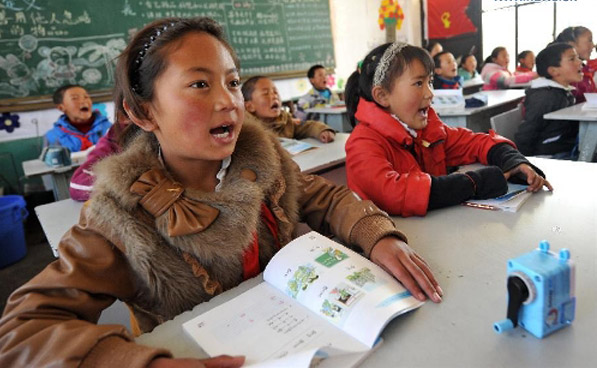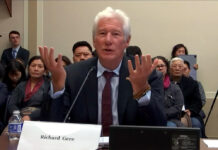
(TibetanReview.net, May26, 2018) – China’s conviction on May 22 of the Tibetan language rights activist Tashi Wangchuk, sentencing him to a five-year jail sentence for allegedly “inciting separatism”, brings into question what the country’s real language policy is. After all, the case exposed the country’s constitutional and legal protection of the ethnic minorities’ right to preserve their own language as being totally a hoax.
A report based on an interview with Zhou Wei, director of the Institute of Religion at the China Tibetology Research Center, carried by China’s online Tibet news service eng.tibet.cn May 25 makes it clear that it is all to do with President Xi Jinping Thought on Socialism with Chinese Characteristics for a New Era.
Citing Xi’s past remarks about “uniting the masses”, “winning over the people”, “strengthening exchanges among all ethnic groups”, “fostering a strong sense of community for the Chinese nation”, “encourage more exchanges and interactions among different ethnic groups”, “helping them remain closely united like the seeds of a pomegranate that stick together”, and “working jointly for common prosperity and development”, Zhou has made it clear that it is all to do with making ethnic minorities learn and use Mandarin Chinese for the sake of national integration from the angle of language integration.
Zhou has made it clear that for all these purposes, learning Mandarin Chinese is a requirement for the ethnic minorities, apparently at the expense of their own language and culture. “Ethnic minorities study Mandarin, the national common language, helps them communicate and cooperate with people of other ethnic groups, integrate into society, and is a requirement for the development of ethnic minorities,” he was quoted as saying.
He has further said, “Language is the bridge between cross-cultural communication and the core of strengthening exchanges and integration among different ethnic groups. An important symbol of cultural mixing is language integration.”
Zhou, who is reported to be proficient in Chinese, Tibetan, and English, is said to have given advice on how to promote exchanges among different ethnic groups from the angle of language integration.
Zhou has sought to “stress” that “languages are equal; there isn’t one that is superior to others” and pointed out, “As early as 1987 and 1988, a series of publications on ‘Regulations on the Learning, Use, and Development of Tibetan Language in the Tibet Autonomous Region (Trial Implementation)’ was issued to incorporate the study, use, and development of Tibetan language into the legal system.” He has also said, “In 2002, the ‘Regulations on the Learning, Use, and Development of Tibetan Language in the Tibet Autonomous Region’ was revised and published again, affirming the Tibetan language’s status as a common language in Tibet and also indicating the equal status of the Tibetan language with the common spoken Mandarin in Tibet.”
The problem, however, is that all this is on paper only, for the whole officialdom is dominated by Mandarin Chinese, including right from school education at the preprimary level upwards. Even the delegates from the Tibet Autonomous Region to the Chinese National People’s Congress – or parliament – would speak only in Chinese when they recently visited Canada and the USA and addressed meetings and press conferences.
The report described Zhou as an authority on the Tibetan language, having majored in Tibetan and minority language studies in both his undergraduate and graduate studies and taught Tibetan language and culture courses for one year in Hungary. He was said to have organized experts to compile China’s first Tibetan reference book for primary and middle school students, the Middle and Primary School Tibetan Language Dictionary. In April of this year, his new book Language and Society of Tibet was reported to have been published by the Social Sciences Literature Publishing House.





